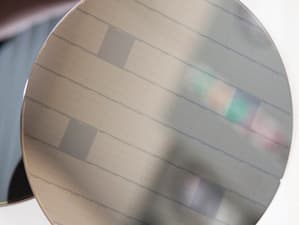IBM To Come Out With Commercial Nanotube Transistors
Way back in 1998, IBM was the first company to come out with a working carbon nanotube transistor. Now 16 years later, the company has committed to bring out a commercial version of this transistor by 2020. IBM claims that chips manufactured using these transistors will be faster and of course, smaller. While Intel's latest chips boast a size of 14 nanometers, IBM's chips will be of a size of 5 nanometers. IBM said that the carbon nanotube technology is the only one by far which can cope with reduced size as well as increased computing power.

Each chip on this wafer has 10,000 nanotube transistors on it
Moore's Law, a prediction made a few decades back in 1965 said that the number of transistors on a chip would double every two years and the current generation is using the 14 nm technology. Keeping this law in mind, manufacturers have set the year 2020 target for introduction of a new generation of chips which will be based on the 5 nm technology. However, since the past decade, chip designers and engineers have been pestered by the problem of reducing the size of transistors. Since silicon transistors now cannot be shrunk below a threshold size, researchers and engineers have focussed away from traditional materials to newer ones such as carbon nanotubes.

Carbon nanotube transistors in solution
IBM's transistor design consists of six nanotubes lined in parallel with each tube being 1.4 nm wide and 30 nm long. Each nanotube is spaced roughly at a distance of 8 nm from the other. Both the ends of the nanotubes are embedded in electrodes which supply electrons and a third electrode runs perpendicularly beneath the 10 nm exposed part and is used to switch the transistor on and off. This design has been tested but the implementation of this isn't 100 percent successful since the nanotubes cannot be positioned closely enough. This represents the limitation in the current technology where we have difficulties working on a molecular level.
That being said, IBM claims it has devised steps for mass production of nanotubes but as of now, the carbon nanotube transistor chips remain confined to the labs. It is said that if the nanotube technology doesn't make it, little else will do. The closest alternative we have today are devices that manipulate the spin of individual electrons, based on principles of spintronics. But they are in very primitive stages and unlike carbon nanotube transistors, they do not behave in the same way as silicon transistors.
Source: #-Link-Snipped-#

Each chip on this wafer has 10,000 nanotube transistors on it

Carbon nanotube transistors in solution
That being said, IBM claims it has devised steps for mass production of nanotubes but as of now, the carbon nanotube transistor chips remain confined to the labs. It is said that if the nanotube technology doesn't make it, little else will do. The closest alternative we have today are devices that manipulate the spin of individual electrons, based on principles of spintronics. But they are in very primitive stages and unlike carbon nanotube transistors, they do not behave in the same way as silicon transistors.
Source: #-Link-Snipped-#
Replies
-
 Rachel carolineThis is absolutely Stunning ! great work ! Am sure dat this is sure t take IBM light years ahead in its reputation
Rachel carolineThis is absolutely Stunning ! great work ! Am sure dat this is sure t take IBM light years ahead in its reputation -
 Chaitanya KukdeIBM has done pioneering works in many fields and this may turn out to be IBM s most valuable research until now
Chaitanya KukdeIBM has done pioneering works in many fields and this may turn out to be IBM s most valuable research until now -
 Ankit LitoriyaAs
Ankit LitoriyaAs
As it is looking ...Chaitanya KukdeIBM has done pioneering works in many fields and this may turn out to be IBM s most valuable research until now
innovation like this are keeping alive scale integration in electronics.
You are reading an archived discussion.
Related Posts
All aboard the deep learning train! Deep Learning is an umbrella term given to a set of machine learning algorithms that are usually derived from neural networks. Neural networks are...
The South Korean giant has taken covers off the Galaxy S5 mini smartphone. Though it was expected that the company would scrimp on sensors to reduce price, the S5 mini...
Capacitors can be thought of mothers back up plan for end of month. when her stocks for the month and guests arrive, she open a stocked grocery(placed into a big...
I'm wondering if we can come up with a set of instructions which we can follow step by step while troubleshooting any computer or network issue. I was trying to...
As you enter the professional world, it's essential that you learn a few common sense based professional email writing protocols. I've found out that a LOT of freshers send emails...
